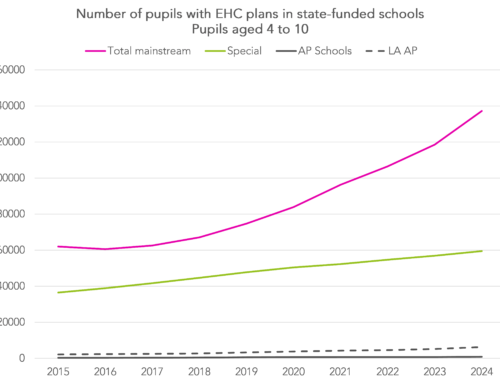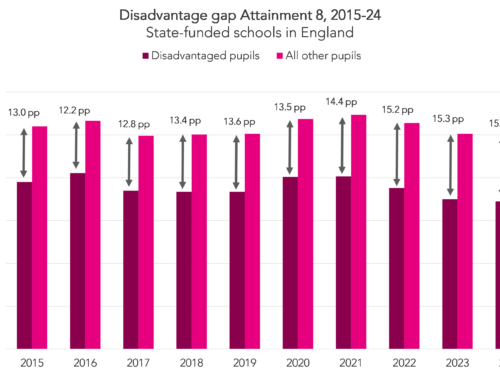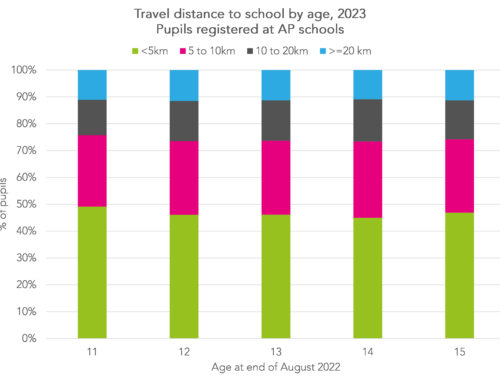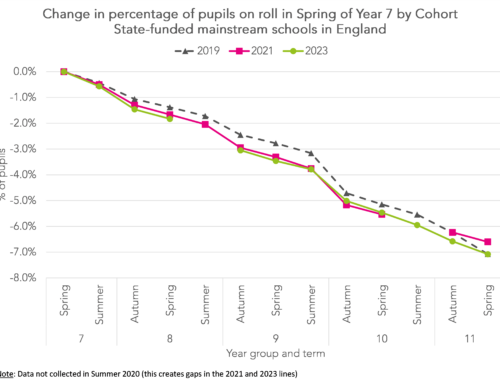
It is worth summarising some of the things that we have observed in the course of this analysis.
Relatively small changes to the rules that determine whether a child has passed or failed the 11-plus in Kent would lead to material changes in who is considered to have passed the test. And the complexity of the Kent Test pass criteria leaves high proportions of students on the cusp of passing or failing the test.
Headteacher panels may be no better at identifying the most academically capable children than the 11-plus tests themselves – most likely limiting the extent to which this part of the process corrects for issues that exist with the tests.
Children eligible for free school meals score particularly poorly in the reasoning element of the Kent Test compared to other elements – reflecting, perhaps, this being a component where some children’s scores are lifted by private education or tutoring.
Children eligible for free schools meals generally do have a better success rate at headteacher panels than those who are not eligible, but the gap may not be as great as we would expect, given other characteristics of these FSM-eligible children.
Transparency over test reliability
Kent County Council should ask its commercial test provider to publish full classification accuracy statistics following each round of admissions. Parents should have a right to know this statistic for their child’s test result.
Two straightforward changes to the 11-plus process in Kent might make it less time-consuming to administer and equally reliable:
- Kent should consider implementing a straightforward overall pass mark, as other grammar schools do, to reduce the proportion of pupils just one mark away from passing/failing;
- Kent should consider removing the headteacher panel and correspondingly lowering the pass mark on the test.
Improving access to grammar schools for disadvantaged students
In general, students who are FSM-eligible do not attend grammar schools because they have lower attainment at age 11. However, there is much that Kent could do to marginally improve the number of children from disadvantaged backgrounds securing places at grammar school.
These include:
- Allowing state primary schools in Kent to provide 10 hours of practice on reasoning-style questions to all students.
- Automatically awarding FSM-eligible students extra marks on the 11-plus – particularly the reasoning paper – in recognition of the disparity between their 11-plus marks and subsequent SATs grades.
- If headteacher panels are to remain part of the process, requiring primary headteachers to put all FSM-eligible students scoring over 300 in the 11-plus forward to the headteacher panel for consideration.
- Allowing primary headteachers to put forward to the headteacher panel any able FSM-eligible students whose parents did not enter them for the 11-plus, who will be considered on the quality of their primary school work alone.
Found this series of posts interesting? Sign up to our mailing list to get notifications about new blogposts, or to receive our half-termly newsletter.






The comment on the “Today” programme contained the words “throw of a dice”, you cannot throw a dice, you may throw a die, or throw dice. Education Lab ?
A very interesting series of posts that is far more subtle than the 3rd party reporting of the recommendations that drew me to read the original source.
However I strongly believe that extra 11+ points for children on Free School Meals or otherwise disadvantaged are NOT the way forward – the unintended consequences are all too obvious:
* struggling children in grammar schools
* aggrieved families with higher scoring children missing the cutoff
* families gaming the system by becoming “self employed” at the crucial time to qualify as low income.
* artificial divorces to leave children with “single mothers”
It is clear to anyone without a political axe to grind that on average, children’s talents (IQ + environment) are positively correlated with family income and social status, so it is impossible to say what is the appropriate 11+ score premium to correct for the innate talent of the FSM group – and note that it is a group that is just a proxy for disadvantage – some FSM children will be coached and have wonderful parental support and some non-FSM children will not have these advantages.
Furthermore you are introducing further distortions around the FSM boundary, Why should a child whose family income is just below the FSM threshold get extra points while the child whose family income is just above does not?
What about other special circumstances such as recent immigrants with English as a 2nd language?
I firmly believe that “positive discrimination” or quotas are always inappropriate and cause more serious problems than they solve.
However, I completely agree that there IS a massive discrimination against talented children from low socioeconomic groups which is the testing process and specifically the ludicrous ban on state school coaching of the 11+ test.
It is irrational for politicians to complain about low social mobility while at the same time not allow coaching in state schools, while private schools and motivated parents teach children good exam technique (highly important in a speed based test to move on to complete the later questions and leave time to guess the unanswered questions), and give them the crucial confidence and familiarity they need to deal with the unusual questions that 11+ tests contain.
Having been through the eleven plus process, I have first hand evidence that the tests are teachable (my daughter more than doubled her scores on GL practice papers over six months).
Each type of verbal reasoning question has an optimal strategy, the maths questions have shortcuts to be identified and the spelling/punctuation/grammar is limited and predictable.
As well as instigating specific 11+ teaching/coaching in state schools I would recommend the following:
1) Compulsory 11+ testing for all children (like SATS).
2) Compulsory headteacher assessments for ALL children scoring 320+